International Accounting: Harmonisation, Issues, and Case Study
Added on 2023-04-22
11 Pages3350 Words400 Views
Running head: INTERNATIONAL ACCOUNTING
International accounting
Name of the student
Name of the university
Student ID
Author note
Declaration: I declare that all materials included in this report are the end result of my own
work and those due acknowledgements have been given in the references to all sources be
they printed, electronic or personal.
International accounting
Name of the student
Name of the university
Student ID
Author note
Declaration: I declare that all materials included in this report are the end result of my own
work and those due acknowledgements have been given in the references to all sources be
they printed, electronic or personal.

1INTERNATIONAL ACCOUNTING
Table of Contents
Executive summary....................................................................................................................2
Introduction................................................................................................................................2
Reasons behind harmonisation...................................................................................................3
Issues involved in harmonisation...............................................................................................4
Case study to illustrate the failure or success of harmonisation................................................5
Adoption of IFRS in Japan seeking harmonisation................................................................5
Adoption of IFRS in Toyota Motors seeking harmonisation.................................................7
Conclusion and recommendation...............................................................................................8
Reference....................................................................................................................................9
Table of Contents
Executive summary....................................................................................................................2
Introduction................................................................................................................................2
Reasons behind harmonisation...................................................................................................3
Issues involved in harmonisation...............................................................................................4
Case study to illustrate the failure or success of harmonisation................................................5
Adoption of IFRS in Japan seeking harmonisation................................................................5
Adoption of IFRS in Toyota Motors seeking harmonisation.................................................7
Conclusion and recommendation...............................................................................................8
Reference....................................................................................................................................9

2INTERNATIONAL ACCOUNTING
Executive summary
Numerous international as well as national organizations including ASC (Accounting
Standards Codification), IASB (International Accounting Standards Board), EC (European
Commission) and FASB (Financial Accounting Standards Board) at present are involved in
the procedure of international and national harmonisation for the financial reporting. The
main objective of the report is to focus on the harmonisation which is considered as a major
objective of IFRS. International financial reporting standards or IFRS are considered as the
set for the international accounting standards that states how the particular kind of
transactions and various other events shall be reported under the financial statements. It is
released by IASB (international accounting standards board) and IASB specified the exact
way to maintain the accounts and report the same. IFRS was formed to have the common
language for accounting so that the accounts and business can be understood from nation to
nation and entity to entity. Further, the report will highlight various reasons behind
harmonisation and issues involved in the same. As a case study for illustrating the failure or
success of harmonisation, Japan will be considered as a country which has adopted IFRS for
harmonisation and whether adoption of IFRS for harmonisation is successful for Toyota
Motors in Japan. Finally, based on the analysis and discussions the report will provide the
conclusion as well as the recommendation for harmonisation.
Introduction
Harmonisation is the procedure that enhances the compatibility of the accounting
practices through setting the limits regarding how much can be varied and standardization
states imposition of narrow and rigid set of the rules and even the single rule or the standard
rules will be applicable for all situations. International harmonisation with regard to the
financial reporting is the global approach that is conducted by different nations for achieving
mutual understandings and assistance with regard to the financial reporting. International
harmonisation allows different countries to follow the same rules while preparing their
financial report (Legenzova, 2016). Specific approaches applied in preparation of financial
statements allow different professionals and accountants to understand different entity’s
financial reports internationally or locally.
There is a variation among standardization and harmonisation. Standardization is the
movement for uniformity whereas harmonisation is the movement away from entire diversity
Executive summary
Numerous international as well as national organizations including ASC (Accounting
Standards Codification), IASB (International Accounting Standards Board), EC (European
Commission) and FASB (Financial Accounting Standards Board) at present are involved in
the procedure of international and national harmonisation for the financial reporting. The
main objective of the report is to focus on the harmonisation which is considered as a major
objective of IFRS. International financial reporting standards or IFRS are considered as the
set for the international accounting standards that states how the particular kind of
transactions and various other events shall be reported under the financial statements. It is
released by IASB (international accounting standards board) and IASB specified the exact
way to maintain the accounts and report the same. IFRS was formed to have the common
language for accounting so that the accounts and business can be understood from nation to
nation and entity to entity. Further, the report will highlight various reasons behind
harmonisation and issues involved in the same. As a case study for illustrating the failure or
success of harmonisation, Japan will be considered as a country which has adopted IFRS for
harmonisation and whether adoption of IFRS for harmonisation is successful for Toyota
Motors in Japan. Finally, based on the analysis and discussions the report will provide the
conclusion as well as the recommendation for harmonisation.
Introduction
Harmonisation is the procedure that enhances the compatibility of the accounting
practices through setting the limits regarding how much can be varied and standardization
states imposition of narrow and rigid set of the rules and even the single rule or the standard
rules will be applicable for all situations. International harmonisation with regard to the
financial reporting is the global approach that is conducted by different nations for achieving
mutual understandings and assistance with regard to the financial reporting. International
harmonisation allows different countries to follow the same rules while preparing their
financial report (Legenzova, 2016). Specific approaches applied in preparation of financial
statements allow different professionals and accountants to understand different entity’s
financial reports internationally or locally.
There is a variation among standardization and harmonisation. Standardization is the
movement for uniformity whereas harmonisation is the movement away from entire diversity

3INTERNATIONAL ACCOUNTING
in the practice. The process of harmonisation allows raising funds from foreign investors.
Further, the foreign lenders as well as financial analysts are able to understand financial
statements of international entities and comparing opportunities for investment that may
assist them in making right decisions regarding investments (Biondi, 2017).
Reasons behind harmonisation
Accounting harmonisation level is recognized in 3 steps, namely global harmony,
regional harmony and total disharmony. Regional harmony for accounting is perceived as
taking place among the nations those are geographically proximate. Global harmony applied
where there is borderless environment and the accounting information can be compared for
different nations and is available readily for the international users. The process of
harmonisation eliminates the variations among accounting practices whereas standardization
is not flexible and does not compile in all the situations (Li, 2017). Further, harmonisation
takes place while various policies of the government and jurisdictions cooperate with each
other for forming identical policy with regard to international agreement in addition to
elimination of national differences. Various other advantages of harmonisation are as follows
–
Challenges for comparisons – harmonisation removes the comparison challenges as
same principles are practiced that allows each practitioner to recognize the financial
statements conveniently. Using of same principles will make the financial statements
from different countries to be more comparable and reliable to the users regarding the
magnitude and nature of the variations. This in turn will reduce risk for the investors
and will bring down the capital costs. Hence, international harmonisation removes the
comparison challenges as re-writing is not required for the financial statements
prepared with standards from other countries (Hopper, Lassou & Soobaroyen, 2017).
Accounts consolidation – international harmonisation reduces emerging complexities
for the financial accountants for consolidating and formulating the financial
statements, as the rules issued by IAS are quite simple and easy to apply. It is
beneficial for the MNCs as requirements for multiple reporting are reduced. Apart
from that international auditing and accounting firms will find it convenient to
convey the accounting skills and knowledge while moving from one nation to another
(Brusca & Martínez, 2016).
in the practice. The process of harmonisation allows raising funds from foreign investors.
Further, the foreign lenders as well as financial analysts are able to understand financial
statements of international entities and comparing opportunities for investment that may
assist them in making right decisions regarding investments (Biondi, 2017).
Reasons behind harmonisation
Accounting harmonisation level is recognized in 3 steps, namely global harmony,
regional harmony and total disharmony. Regional harmony for accounting is perceived as
taking place among the nations those are geographically proximate. Global harmony applied
where there is borderless environment and the accounting information can be compared for
different nations and is available readily for the international users. The process of
harmonisation eliminates the variations among accounting practices whereas standardization
is not flexible and does not compile in all the situations (Li, 2017). Further, harmonisation
takes place while various policies of the government and jurisdictions cooperate with each
other for forming identical policy with regard to international agreement in addition to
elimination of national differences. Various other advantages of harmonisation are as follows
–
Challenges for comparisons – harmonisation removes the comparison challenges as
same principles are practiced that allows each practitioner to recognize the financial
statements conveniently. Using of same principles will make the financial statements
from different countries to be more comparable and reliable to the users regarding the
magnitude and nature of the variations. This in turn will reduce risk for the investors
and will bring down the capital costs. Hence, international harmonisation removes the
comparison challenges as re-writing is not required for the financial statements
prepared with standards from other countries (Hopper, Lassou & Soobaroyen, 2017).
Accounts consolidation – international harmonisation reduces emerging complexities
for the financial accountants for consolidating and formulating the financial
statements, as the rules issued by IAS are quite simple and easy to apply. It is
beneficial for the MNCs as requirements for multiple reporting are reduced. Apart
from that international auditing and accounting firms will find it convenient to
convey the accounting skills and knowledge while moving from one nation to another
(Brusca & Martínez, 2016).

End of preview
Want to access all the pages? Upload your documents or become a member.
Related Documents
International Accounting: Evaluating Harmonisation and IFRS Adoption in Japan with Toyota Case Studylg...
|16
|4293
|488
Harmonization in IFRS rules and regulations - Amara Holdings case studylg...
|25
|4830
|435
Financial Accounting 2022 Theorylg...
|12
|3475
|17
Accounting & Financial Management Question Answer 2022lg...
|21
|5645
|12
The Harmonisation of Accounting Standardslg...
|16
|3014
|72
South Korean Accounting Policies and IFRS Evaluationlg...
|16
|3605
|245